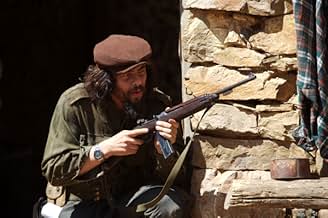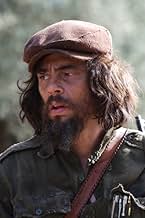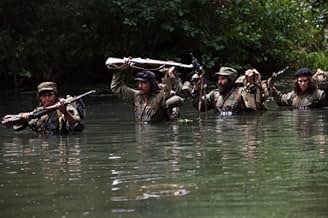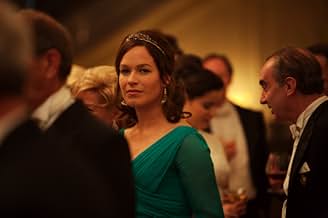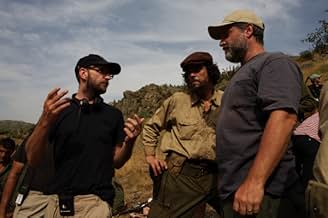Dopo la rivoluzione cubana, il Che è all'apice della sua fama e del suo potere. Poi improvvisamente sparisce, e ricompare in incognito in Bolivia, dove organizza un piccolo gruppo di compagn... Leggi tuttoDopo la rivoluzione cubana, il Che è all'apice della sua fama e del suo potere. Poi improvvisamente sparisce, e ricompare in incognito in Bolivia, dove organizza un piccolo gruppo di compagni cubani e reclute boliviane destinati a dare inizio alla grande rivoluzione latino-americ... Leggi tuttoDopo la rivoluzione cubana, il Che è all'apice della sua fama e del suo potere. Poi improvvisamente sparisce, e ricompare in incognito in Bolivia, dove organizza un piccolo gruppo di compagni cubani e reclute boliviane destinati a dare inizio alla grande rivoluzione latino-americana.
- Regia
- Sceneggiatura
- Star
- Premi
- 2 vittorie e 7 candidature totali
- Fidel Castro
- (as Demian Bichir)
Recensioni in evidenza
While the movie's tone in some regards does stray off and differ quite drastically from Part One however, there still remains that same documented approach taken a month ago that avoids melodrama and fabrication as much as possible. This somewhat distant, cold approach to telling Che's story and struggle will no doubt turn some viewers off; indeed, I still remain reserved about whether or not the feature itself should have been named after one manif anything, the entirety of Che, taken as a whole, delivers a tale that goes beyond mere biography and instead documents a man's struggle alongside those who helped carry him along the way. By no means does Soderbergh try to paint a humanistic portrait here akin to what Hirschbiegel did with Der Untergang half a decade ago (excuse the ironic contrast); Che is a slow moving, reserved and meditative approach to telling a history lesson that just happens to be narrated by the one man who arguably- conducted the whole thing.
Yet by moving from the lush green landscapes of Cuba and retreating to the bleak, decaying backdrop of Bolivia for Part Two, the story does inevitably take on a distinctly contrasting tone that doesn't feel too disjointed from its predecessor, but does enough to give it its own reference points. Here, the basic structure of Part One is echoed backthere's the initial struggle, the battles, the fallen comrades and the recruiting of those to replace them, all the while we see some glimpses of the man behind the movement. Yet, as anyone with the vaguest idea of the actual history behind the feature will know, Part Two is destined to end on a much more underwhelming, and disquieting note. This difference, in combination with the similarities to Part One, make a compelling and memorable whole; by all means, both could be digested one their own (and kudos to Soderbergh for achieving as such) and enjoyed as they are, but taken as one statement, Che delivers exactly what it sets out to achieve.
Indeed, everything that made Part One the treat that it was one month prior is still evident here from the subtle yet engrossing performances from the central cast to the slow building, realistically structured combat scenesthe drama inherent to the characters on screen is just as vague and indiscernible, but with a feature such as this, Part Two once again proves that avoiding such elements don't necessarily hurt a film when there is enough plot and reflection on other elements to keep the viewer engaged. In fact, upon writing this review I was at odds as to whether or not to simply add a paragraph or two to my initial review for Part One, and title the review as a whole, yet I felt that to do so would only serve to disillusion those who may sit down to watch the entirety of both films consecutively.
With that said, I cannot rightfully decree whether or not Che holds up to the task of engaging an audience for its sprawling four hour plus runtime, but upon viewing both segments I can at least attest to each part's ability to do just that. With a reflective, intricate screenplay combined with endlessly mesmerising photography and nuanced performances that do justice to the movie's characters without drawing attention to themselves, Che Part Two is every bit as compelling and rewarding as its predecessor, but this time with a tragic but uplifting, reaffirming conclusion fit for the history pages of film.
- A review by Jamie Robert Ward (http://www.invocus.net)
The pair of films, overall, are most memorable for their sequences of Guevara's guerrilla army training and battling in the jungles and waters of Cuba and Bolivia and especially for the climactic battles near the end of each film. They may each be overlong and not chart as much territory as they perhaps should. Some may wish they would delve further into the obscure intimacies of his life, especially for the benefit of those already familiar with his activism. Others may feel the film does not question his militant means often or strongly enough. No, the films are not perfect, but lesser movies than these have been well received and, as such, these two are worth a look.
James Rocchi, for instance, called it, a work of art that's, "not just the story of a revolutionary," but, "a revolution in and of itself." The Guardian's Peter Bradshaw called it a "flawed masterpiece." I return to my original contention for Part One that the value lies particularly in depiction of a hero figure. And in an age when there is a surfeit of poor hero role-models, could it not be salutary to see a strongly honourable one, even if stripped of some of the less endearing episodes of his life? This is the psychological hero enshrined by the great Scottish essayist, Thomas Carlyle, in his seminal book, Heroes and Hero Worship. Heroes can be real or imaginary (or somewhere in-between). But should genuinely inspire us to higher goals, a higher purpose. Compare this with the unrealistic 'heroes' of standard Western storytelling: where a person undergoes trials and tribulations before obtaining a barely-believable reward usually everlasting love or material wealth as if by divine studio intervention. Real heroes have an excess of moral courage not Lost Ark dare-devilishness or James Bond super-toys. They rise, and empower others to rise, to be the best that they can be. In Part One, Che succeeds. In Part Two, he fails. It is not for want of moral courage but since a) not all good plans can succeed and b) being human, mistakes are inevitable.
Guevara's intellectual clarity is flawed when he equates conditions that justify armed struggle with conditions that make that armed struggle able to succeed. It is a serious miscalculation.
High in the mountains from La Paz, the colours are breathtaking. There is an air of mise-en-scene authenticity that was occasionally lacking in Che - Part One (The U.S. would not allow Soderbergh to film in Cuba.) Visual treats are heightened by maximising natural light and the extreme flexibility and realism offered with groundbreaking RED cameras. This is a high performance digital cine camera with the quality of 35mm film and the convenience of pure digital. Designed for flexibility and functionality, the package weighs a mere 9 lbs. "Shooting with RED is like hearing the Beatles for the first time," says Soderbergh. "RED sees the way I see . . . so organic, so beautifully attuned to that most natural of phenomena light." If Che had stopped with the successful Cuban revolution it would have enshrouded him with an almost mystical invincibility. That he fails in Bolivia shows not only that he has human limitations but that it is his moral virtues that are remembered, not the political triumph. Critics will say and with some justification - that his armed struggle inspired much less noble characters to achieve tin-pot dictatorships. His development of guerrilla fighting tactics are not good or bad in themselves (and have since been used for both).
But for all its praiseworthiness, the film often seems to lack dramatic and narrative tension. We stumble from one escapade to another, knowing that he will eventually meet his death. I found myself glancing at my watch and thinking it could have been shorter. But the work that has gone into this interviews with people from all sides and even getting one of Guevara's ex-comrades to coach actors on the minutiae of the Bolivian operations make the film a commendable achievement. It might not be top-flight entertainment, but it demonstrates integrity in documenting a significant slice of history.
There is also another very important point in the Che 'hero' figure here. It's about failure. That if you try your utmost, even if you fail, your effort will not have been in vain because it may give others hope and moral courage. One could cynically call it a 'martyr' complex, and it is found, of course, in many religious figures as well. But Che does not 'sacrifice' himself. He does what he does best, to the best of his not inconsiderate ability, and so provides an example. Success or failure in any particular instance become mere details.
With the U.S.'s longstanding and illegal blockade of Cuba (all in the name of 'freedom'), I am tempted to write that Che Parts 1 & 2 are too good to be wasted on the U.S. But that would be to invite a contention that the film has sought so earnestly to avoid. One must hope that many viewers will have the skill to view Che without politics and the bias that inevitably engenders. Whatever its faults, it rehabilitates Soderbergh from the populist nonsense of Oceans 11.
But if you haven't heard of Che Guevara or seen Part One, or if you can't get past the phrase 'murderous Marxist' without frothing at the mouth, I might struggle to imagine what you would get from this film. The same can be said for many who have, and can.
Guerrilla works remarkably well as a standalone film. The story of Che's failed attempt to lead a revolution in Bolivia, then under military rule, is a compelling tragedy. The initial impetus brought by Che's arrival incognito to lead the guerrilla war is lost as misfortune follows misfortune. The odds stack up against the revolutionaries. US backing for the Bolivian army, hostile conditions in the rainforest, suspicious locals and Che's failing health are just some of the difficulties which beset the nascent rebellion.
Soderbergh's portrayal of Che is largely uncritical, but this film is no hagiography. The style is refreshingly undramatic, with a subtle and effective soundtrack by Alberto Iglesias adding quiet drama to many scenes. Che is undoubtedly the centre of the film but there are very few close-ups of his face and we are encouraged to see the people fighting alongside him and sometimes against him too. Where Soderbergh wishes to demonstrate Che's virtues we see it in small episodes such as the loyal acolyte who upbraids two fellow guerrillas when they question Che's leadership, and emphasises the sacrifice that he has made in leaving behind Cuba to fight again for revolution.
The direction throughout is superb. Part two feels tightly edited despite its narrow focus and is able to communicate a great deal through images without the need for a narrator to spell things out for the audience. At the start of the film we see a few short clips of lavish parties in post-revolutionary Cuba, immediately furnishing us with ideas as to why Che would sacrifice his old life to fight again in another country. Later on, the portrayal of guerrillas marching through the unending rainforests stands out as a strikingly beautiful scene and helps to create a feeling of the enormity of the task before this tiny band of revolutionaries.
If there is a problem with the film it is the distance between the viewer and Che, which, though it does allow us to appreciate the context of the insurgency and the people around him, makes it hard for us to understand him better as a person. True, Benicio Del Toro is utterly convincing in the lead role so much so that it is difficult to remember that you are watching an actor and not the man himself. However, watching Guerrilla as a standalone film means that we are given precious little insight into what is shaping Che's thoughts, words and actions. It is to be hoped that this is more to the fore in the first part of Soderbergh's biopic (I cannot comment on that yet), and certainly the strength of part two is making me look forward eagerly to seeing the prequel.
Lo sapevi?
- QuizWas the first feature-length movie to be shot with the Red One Digital Camera, as well as the first mainstream film to be shot in the 4K resolution. (Part One was also shot with this camera, but Part Two was shot first so Benicio Del Toro could gradually regain the weight he lost for this film)
- BlooperAt his execution, Che was shot a total of nine times, not three as shown in the movie.
- Citazioni
Ernesto Che Guevara: To survive here, to win... you have to live as if you've already died.
- Colonne sonoreBalderrama
Lyrics by Manuel José Castilla
Music by Gustavo Leguizamon
Performed by Mercedes Sosa
Courtesy of Universal Music
Copyright (c) by Lagos Editorial (Warner/Chappell Music Argentina)
I più visti
Dettagli
Botteghino
- Budget
- 40.000.000 USD (previsto)
- Lordo Stati Uniti e Canada
- 748.555 USD
- Fine settimana di apertura Stati Uniti e Canada
- 61.070 USD
- 14 dic 2008
- Lordo in tutto il mondo
- 8.638.163 USD
- Tempo di esecuzione2 ore 15 minuti
- Colore
- Mix di suoni
- Proporzioni
- 1.85 : 1
Contribuisci a questa pagina



